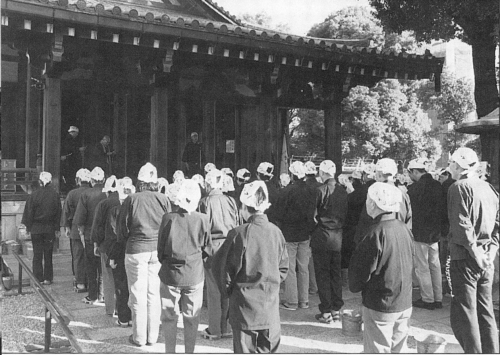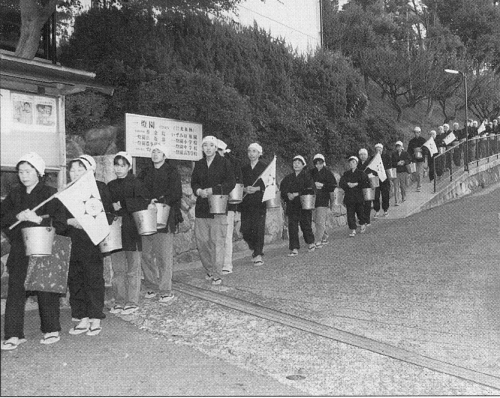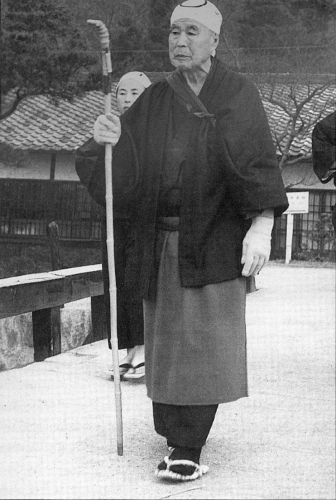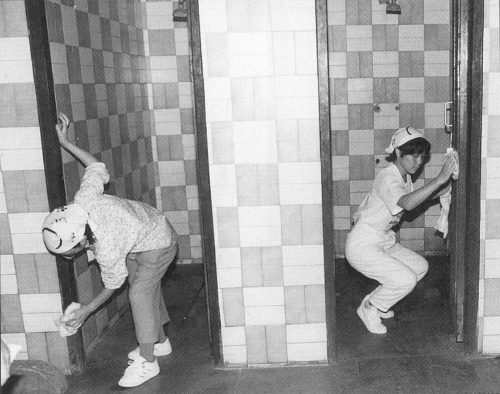A friend had told me about Sho Ishikawa, who had grown up in Ittoen, a commune near Kyoto where toilet cleaning was considered a path to self-knowledge. Sho’s parents had spent most of their lives in the commune. Indeed, his father was in some ways one of the present spiritual leaders.
Sho himself now lived in Manhattan and worked in public accounting. “It is difficult to imagine cleaning for your whole life,” he warned me during the first of our phone conversations.
But perhaps I could. To augment my earnings as a writer, I had been cleaning professionally for six years.
Ittoen, “One Light” or “One-Lamp Garden,” is a community inspired by the spiritual awakening, teachings, and life example of a man named Tenko Nishida (1872-1968). Not a religion in the sense of a creed with a specific object of worship or set of scriptures, Ittoen honored Tenko-san’s “Oneness of Light” philosophy while embracing all spiritualities grounded in the ideal of humble service. Both Buddha and Christ lived the life of the homeless, I would be reminded later, and both washed the feet of others.
Tenko-san had first become disenchanted with capitalism in the late 1880s. Unwilling to struggle against others for his own survival, he challenged the assumption that one worked in order to live. Tenko-san’s awakening came after three days of meditation: Life was given freely to all by “the Light,” or by God, and was not something that had to be worked for. Work was therefore a way of offering thanksgiving for the gift of life.
Renouncing his family, his status, and all possessions, Tenko-san began to serve others. He scrubbed, chopped wood, and cleaned privies. Declining all but the bare necessities, service became the way he connected with others. For him, this was enlightenment. Over the years, Tenko-san attracted followers, and in 1928, some land was donated for the establishment of a community. In the 50’s and 60’s, the commune had hundreds of members. Now, nearly thirty years after his death, only about one hundred and fifty remained.
I don’t think Sho quite knew why I wanted to travel ten thousand miles to scrub toilets with a bunch of people I couldn’t even talk to, and I wasn’t sure myself. Nevertheless, after a succession of phone calls to Japan, a week-long visit was arranged that would culminate on the national Day of Labor, a day the entire community went cleaning. Sho’s English teacher, a woman close to seventy who had lived over forty years in the commune, would be my official host.
The Ittoen compound is tucked into the hills east of Kyoto. Gorgeously kept grounds—maples and mossy, rolling hills—hug an odd array of buildings. Several older women were sweeping leaves with traditional bamboo brooms.
Outside the office, I met Sho’s teacher, Ayako Isayama, a slight, short-haired woman in a black, karate-gi-like smock. She politely invited me to follow her to my room, then took off at such a clip that in order to keep up I was forced into a gallop.

I had imagined a small group of dedicated cleaners, living in spartan quarters, buckets and sponges always at hand. Instead, I found a highly organized group who run what is essentially a small town with its own complicated economy. I would soon learn that, although members own little personal property—all possessions are given up upon joining—the commune supports itself by operating various businesses including schools, a press, a theater group, and a “theme park,” dedicated to the ideal of peace, located in a southern province.
The group also facilitates training sessions for young factory workers and businesspeople, and as we approached the building in which I was to stay, we encountered a line of gi-clad men and women who looked, as they jogged past, to be in their early twenties. Though it was late afternoon and the fall air was crisp, they wore their flip-flops barefoot, without tabi, the split-toed Japanese socks.
“Mr. Donut workers,” Ayako explained, “Four days’ training. Humble toilet cleaning, door-to-door service.”
Four thousand Mr. Donut workers spend time at Ittoen each year; the training is meant to promote humility and facilitate group dynamics. They are assigned specific houses in nearby towns for toilet cleaning. And they seek out a variety of other tasks—washing clothes, babysitting, weeding—wherever they are needed, undertaking such service in the tradition oftakuhatsu, the “begging-bowl rounds” practiced by Zen monks, who still visit households reciting sutras. The last day is set aside for the workers to reflect on their training.
It’s a stretch for me to imagine a group of American workers, say from Dunkin’ Donuts or Burger King, jogging door-to-door, heads bowed, begging to clean toilets.

That night, Ayako made dinner in the quiet, dark kitchen of our dormitory. We chatted in simple English. I asked if I might be able to clean with the Mr. Donut trainees. Ayako, considering my request, looked away from me. “Difficult, with no Japanese,” she shorthanded. “May not be possible.” She rose and began to wash the dishes. “Saturday,” she said. “You clean then, with the group.” It was Monday. “Morning service at 5:30,” she announced.
At dawn’s light I followed Ayako down the dusky corridor of our ancient building, where she sped off towards the Spirit Hall. Inside the bare wood hall, both Buddhist and Christian images flanked the altar. At center position was a round window opening onto a view of the forest. Ittoen elders and Mr. Donut people were seated on both sides of the room, kneeling on tatami platforms, men on one side and women on the other. I took a seat behind Ayako. We began with a song recounting Ittoen history, and then chanted a Buddhist sutra, the gist of which was non-attachment to worldly goods.
After the service, I raced behind Ayako back to our place for the daily morning cleaning. She offered me a choice of toilet brush or broom. I went with the brush and was handed a bucket and rag. Ayako set off to mop the entire building, and was, of course, finished before me. Experience and a lifetime of cleaning, I told myself consolingly.
In the week that followed, I asked Ayako several times about going door-to-door, but each time she seemed evasive. Aside from our morning service, and helping her with some translating, my time was my own. Couldn’t I take the initiative myself, even go into town on my own? The thought of knocking on a door without a translator was daunting. Would they invite me into their bathrooms?
One evening, I flipped through the pages of one of Ayako’s many scrapbooks while she talked about her life. She spoke of her own spiritual awakening, which literally happened after cleaning a toilet.
“I swept the cobwebs and began to scrub. After about thirty minutes the grain of the floor came to be seen and the stool became white. Wiping my sweat, I looked behind me and saw the lady of the house chanting Buddha’s name, her hands in prayer. It was a meeting of two persons, in prayer and in peace. I went outside and saw a tiny blue flower blooming by the roadside. I talked with the blue flower, just like I am talking to you.”
I nodded, but never in my toilet-cleaning life had I ever come close to this kind of feeling, or spoken to a flower.
“In my heart I saw a big tree, with everything in its branches. You, me, air, birds, flowers. I knew everything was related. That was my realization after cleaning that toilet.”
I flipped pages; the photos dated back decades. Many pictures documented roto, the “life of the homeless,” and showed lines of uniformed disciples marching across the countryside or through small Japanese villages. In these, Ayako was often at the head of the group beside Tenko-san.
“Were you ever scared?” I asked. “Not knowing where you’d end up each night?” “Once,” she said. “In America.”
She pulled an album from the bottom of the stack. Inside, there were pictures of Ayako with American families, on a farm, one next to a Washington, D.C. apartment building. And there were newspaper clippings, circa mid-70’s, about a young Japanese “nun” who had volunteered to massage feet at several retirement homes. “For over one month I did humble service. I spent six dollars,” she said. “Two dollars I gave to a church.”
I drew out the whole story, beginning with Ayako’s middle-of-the-night arrival at JFK Airport and the taxi driver who carted her to Manhattan for free at the end of his shift. At Penn Station, while waiting for a bus to rural New Jersey, she cleaned toilets and massaged the feet of a homeless woman.
It was in New Jersey, during a four-hour trek down a country road, that Ayako had felt afraid. She didn’t know where she was going and felt so lonely she was almost crying. When she finally stumbled onto a family home, she explained her mission simply to the woman of the house. “I live in Japan. My work is to help people. May I work for you?” she asked, with her hands in prayer.
She stayed at this house almost a week, cleaning, cooking Japanese food, and working in the garden. “They asked me always to pray over their food,” she said, translating the Ittoen grace: “True faithfulness consists of doing service for others and ignoring your own interests.”
At 6:30 on Saturday morning, about seventy people gathered on the school grounds, each dressed in full Ittoen gear. Our destination was in Osaka, where, as a group, we were to clean a large Buddhist temple. After an official toilet-cleaning poem was recited, we marched out of the compound in a single line, while those staying behind bowed us on our way. With Ittoen flags flying and buckets looped over left arms, we snaked our way down to the nearby town where our buses waited.

Arriving in Osaka around eight, I was escorted with my team to a graveled area about the size of a football field. I was given a bamboo broom. At first look, the ground seemed clean, but closer inspection revealed tiny leaves, cigarette butts, and scraps of litter.
Sweep too hard and the gravel comes up, producing a mound of leaves, dirt, and trash, while leaving bald patches of ground. Sweep lightly and nothing moves. I watched as members of my team flicked their brooms expertly with the precise amount of oomph. In hopes of getting the ‘trick,’ I experimented with left-handed, right-handed, and back-handed techniques. After an hour, I had barely swept a quarter of the space completed by the others.
As we approached a particularly dirty and trash-laden area, I noticed a group of men sprawled on some stairs outside an abandoned building. Even at this early hour, most had been drinking. Red-faced and weary, they were watching us work. It made me nervous.
As we neared, several men got up and began throwing trash in the bins and stacking empty bottles. Then I remembered something Ayako had told me about Tenko-san. In his day, when down-and-outs came to Ittoen, as many did following the war’s devastation, each was welcomed and given food and shelter. But after two days, they were required to join work groups or do roto. Tenko-san believed handouts would brew resentment and keep people disempowered. Work would reveal a heart of thanksgiving.
Over the course of the day, I had felt like my sweeping was improving, but at quitting time, I realized that someone from my group had always been working some distance behind me. I looked at the path that I’d cleared and then at the ground they had passed over. Shards of leaves and a tiny confetti of trash spotted my work. Where they had swept, the ground was pristine, a carpet of smooth, gray rock.
Suddenly, I was really tired.
On the bus ride back to Ittoen, the skyscrapers of Osaka disappearing behind me, I questioned if I were capable of selfless cleaning. The week’s experience had set me face-to-face with my shortcomings and fears. In my cleaning world I got things—money, free time, acknowledgment. Here, cleaning was about giving everything up. A simple life, but complicated in its implications.
And yet, the complications of my life—what to do or be, where to live—fell away against the backdrop of this selfless community. Dust to dust? Who really believes it?
My last tea-time with Ayako was brief. She offered tangerines, tart and juicy.
“How can others—how can I—live Ittoen principles out there? In America?”
Ayako’s eyes were downcast. She carefully separated the sections of her fruit and didn’t say anything for what seemed a long time, though this wasn’t unusual during our talks.
“Live a simple life with an affluent spirit.”
I sipped my tea and flipped again through my favorite photo album, the one with pictures of early Ittoen life. There were several photos of Ayako and Tenko-san cleaning together, which now, after my own cleaning experience, seemed truly beautiful. And another: Ayako with her headscarf tied behind her ears, barely visible over the right shoulder of an aged Tenko-san, he steadying himself with a staff, the misty Ittoen hillside in the background.
“Take whatever you wish,” Ayako said.
“But these are originals. You must want them?” I asked. “Others must want them?”
“I’ll die soon,” Ayako said. “A few will be saved. The others will go with my body and with the ashes of others, with the ashes of Tenko-san.”
I peeled several photos from the book, feeling greedy.
“Take care of everything you have,” she added. “Everything given to us is in trust from the Light.”
I thought of the place I owned in the Bay Area. Eight years ago, when I had first quit my job and set off for a writer’s colony, an adventure I thought might last a year, I had sublet the house. Since then, I had lived in at least seven cities, on several continents, snagged at least a dozen sublets myself, and begun my cleaning life.
I knew the basement of my house was now crammed full of other people’s castoffs, and what had been a neatly tended garden was overgrown. The once-bountiful fruit trees were in desperate need of husbandry and no longer producing. A tenant had recently sent me pictures of my bedroom, post-1989 earthquake: cracks and hairline fractures crisscrossed the walls.
It was time to clean house.
Thank you for subscribing to Tricycle! As a nonprofit, we depend on readers like you to keep Buddhist teachings and practices widely available.
